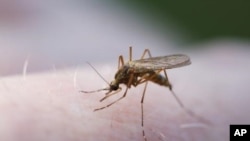Israeli researchers say they have developed a powerful bait that effectively attracts and kills malaria-infected mosquitoes but is completely harmless to humans and other animals.
The toxic sugar bait developed by scientists at Hebrew University Medical Center in Jerusalem is made with a combination of fruit juice essences, which are attractive to mosquitoes, and boric acid - a mild, inorganic powder that kills insects when they ingest it.
In experiments in a semi-arid region of Mali, in West Africa, the bait - in this case a blend of boric acid with guava and honey-melon fragrances - was applied using a hand sprayer on the vegetation near a cluster of man-made ponds. These ponds are important dry-season water supplies for local villagers and their livestock. They are also breeding grounds for Anopheles gambiae, the mosquito that carries the most deadly form of malaria.
For comparison, investigators sprayed grasses and leaves near other ponds with a solution of sweet fragrances only. Both baits contained a dye that marked any mosquito making contact, so scientists could count how many had actually fed on the lure.
Josef Schlein, a medical entomologist who led the study, says the results after 38 days showed the bait containing both sweet fragrances and boric acid proved to be very effective at killing mosquitoes.
"In Mali, we got down by some 80 percent, the females, and 90 percent of the males," he said. "But the area is full of little ponds in there, so it is impossible to stop mosquitoes from flying from an untreated pond to a treated pond."
At the control sites that were treated with fragrances only, Schlein says upwards of 75 percent of mosquitoes fed on the fake bait.
Schlein explains most people don’t realize that female mosquitoes typically feed on sweet plant nectars to survive. Their more familiar blood meals, when mosquitoes bite people, are part of the reproductive cycle.
The researchers’ goal now is to make a lure that’s even more irresistible to mosquitoes.
Research leader Josef Schlein notes that boric acid poses little risk to humans and other mammals, so it’s possible a mosquito lure could be developed for use indoors. Given the non-toxic simplicity of this new bait, the Hebrew University entomologist says it’s a marvel that other scientists didn't think of it sooner.
"Yes. It was also a real surprise to us," he said. "If they go somewhere and they are strongly attracted to something, what else do we want to do with mosquitoes except kill them?"
An article describing the malaria mosquito bait is published in Malaria Journal.




